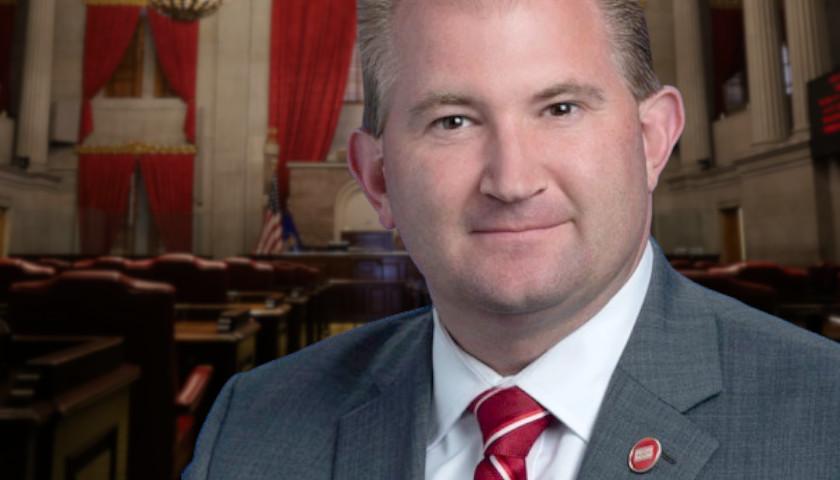The state legislature passed 513 Public Acts in the first half of the 111th General Assembly, many of which go into effect on July 1, 2019, and impact the general public like the “hands-free” driving law.
The new “hands-free” law, as previously reported by The Tennessee Star, defines what it means to be “hands-free” and extends the requirement to be “hands-free” from just schools zones to all Tennessee roads and highways.
In addition, a law that passed in 2017 will also be hitting Tennesseans again on July 1.
Namely, the Improving Manufacturing, Public Roads and Opportunities for a Vibrant Economy – IMPROVE Act, also referred to as the 2017 Tax Cut Act, will increase the tax on gasoline by another $0.01 and the diesel tax by another $0.03 effective July 1.
These are the final increases to the two fuel taxes, which went up $0.06 on gas and $0.10 which went up three times starting on July 1, 2017.
The tax on Compressed Natural Gas and Liquified Gas will also go up by $0.03 each on July 1, completing the $0.08 total increase over the same three years.
Meanwhile, the Hall Income Tax phase out, which was one of the tax cuts intended to offset the fuel tax and registration fee increases Tennesseans would be hit with starting in July 2017, won’t be fully repealed until January 1, 2021.
Many of the 513 Public Acts that were passed by the Tennessee General Assembly between January and May 2019 went into effect at the time of becoming law, and therefore, may have been in effect for several months at this point.
Once a bill affecting the general public becomes law, it becomes a Public Act and is assigned a Public Chapter number, or PC No.
Some laws that became a Public Act may be interesting, but not necessarily have an effect on Tennesseans’ daily lives.
For instance, PC No. 215 designates the poem “My Tennessee,” written by Michael McDonald in 1984, as the official state poem of Tennessee and PC No. 7 designates the bluetick coonhound as the official state dog.
For those who partake in alcoholic beverages, PC No. 300 authorizes their sale along with beer for consumption on the premises of Zoo Knoxville and Nashville Zoo during the zoos’ regular operating hours.
Here is a list of Public Acts, not intended to be all-inclusive, which go into effect on July 1, 2019.
PC No. 60 – increases the penalty for using an unmanned aircraft over a critical infrastructure facility, now including communication service facilities, without the business operator’s consent from a Class C misdemeanor to a Class E felony.
PC No. 83 – permits a designation as joint primary residential parents or a waiver of the primary residential parent designation upon agreement of the parents when the child is scheduled to reside an equal amount of time with both parents; allows the address of either parent to be used to determine school zoning when the child is scheduled to reside an equal amount of time with both parents.
PC No. 93 – a marriage license may not be issued for an applicant under 17 years of age.
PC No. 126 – the “March Madness and Fantasy Football Freedom Act,” decriminalizes, under certain circumstances, wagers on fantasy sports leagues and sports pools.
PC No. 132 – increases from over $30,000 to over $50,000 the amount of gross contributions that must be raised or received from the public by a charitable organization in order to trigger registration requirements with the secretary of state.
PC No. 140 – the “Sergeant Daniel Baker Act” removes the appeal to the court of criminal appeals in death penalty cases; provides for automatic direct review by the Tennessee supreme court for convictions for which a sentence of death is imposed.
PC No. 159 – exempts from the tax admission, dues, fees, or other charges paid to any person principally engaged in offering services or facilities for the development or preservation of physical fitness through exercise or other active physical fitness conditioning.
PC No. 164 – creates Class A misdemeanor of possessing, owning, selling, transferring, or manufacturing cock fighting paraphernalia with the intent that the paraphernalia be used in promoting, facilitating, training for, or furthering cock fighting.
PC No. 178 – extends the exemption from sales and use tax on trailers used to transport livestock when such trailer is sold to a qualified farmer or nurseryman to also exempt such sales of trailers used to transport farm products, nursery stock, or equipment, supplies or products used in agriculture, or for other agricultural purposes relating to the operation and maintenance of a farm.
PC No. 184 – prohibits persons from loitering or conducting any commercial activity in, or in proximity to, the median of a state highway; creates a Class C misdemeanor offense that requires issuance of a warning citation for a first offense; creates certain exceptions.
PC No. 200 – removes $180 fee for an individual petitioning the court for an expunction of certain criminal offenses; removes $350 fee for a defendant applying for expunction of an offense following the completion of a diversion program.
PC No. 207 – exempts a person who engages in hair braiding from the cosmetologist licensure requirements if certain requirements are met.
PC No. 210 – prohibits a county or municipality from requiring a license, fee, permit, or other form of regulation for a business that is operated solely by a person under 18 years of age, is located on private property with the property owner’s permission, and generates gross receipts of contributions of $3,000 or less in a calendar year.
PC No. 211 – increases the punishment for a conviction of aggravated rape of a child from “15 to 60 years in prison and a fine of up to $50,000” to “life in prison without the possibility of parole.”
PC No. 231 – adds the sale or distribution of a substance containing fentanyl, carfentanil, or any opiate with the intent and premeditation to commit murder as an aggravating circumstance for the imposition of the death penalty or imprisonment for life without the possibility of parole.
PC No. 251 – redefines “public place” for purposes of the offense of indecent exposure; includes a restroom, locker room, dressing room, or shower, designated for multi-person, single-sex use.
PC No. 262 – requires court clerks to report the race, sex, and, if known, social security number of a person judicially committed or adjudicated a mental defective to the federal bureau of investigation-NICS index and the department of safety for use in determining a person’s eligibility to purchase firearms; requires that such information be confidential.
PC No. 268 – rewrites the criminal offense of female genital mutilation; extends the statute of limitations for criminal prosecutions or civil actions for female genital mutilation.
PC No. 269 – requires that the family life curriculum used in public schools include instruction on the detection, intervention, prevention, and treatment of human trafficking in which the victim is a child; requires each local board of education to require that each teacher employed by the board receive a one-time in-service training on the detection, intervention, prevention, and treatment of human trafficking in which the victim is a child, which must be accomplished through the viewing of a video recording approved by the LEA.
PC No. 303 – expands the Prevention of Youth Access to Tobacco and Vapor Products Act and other laws concerning juveniles’ access to tobacco and vaping products to apply to hemp for smoking.
PC No. 360 – creates offenses related to the possession, sale, distribution, and transport of child-like sex dolls.
PC No. 388 – establishes requirements for the operation of electric foot scooters; specifies that for purposes of the DUI laws, an electric scooter will be considered a motor-driven vehicle.
PC No. 389 – extends a 50 percent discount on camping fees at state parks to veterans who have a 100-percent permanent total service-connected disability.
PC No. 396 – waives the fee for obtaining a lifetime handgun carry permit for former law enforcement officers who served at least 10 years and left the law enforcement agency while in good standing
PC No. 398 – creates the Class A misdemeanor and Class E felony offenses of withdrawing, transferring, or altering a child’s school enrollment with intent to hinder an active child abuse or child neglect investigation.
PC No. 410 – extends the statute of limitation for prosecution of second degree murder from 15 years from the offense to at any time after the offense is committed.
PC No. 412 – prohibits a person from physically holding or supporting, with any part of the person’s body, a wireless telecommunications device or stand-alone electronic device while operating a motor vehicle; imposes other similar restrictions on activities such as texting; creates certain exceptions.
PC No. 415 – authorizes members of the general assembly, duly appointed law enforcement chaplains, and members of the legislative body of a municipality to solemnize marriages; prohibits persons receiving online ordinations from solemnizing the rite of matrimony; requires members of the general assembly who want to solemnize marriage to opt in by filing notice of the member’s intention with the office of vital records
PC No. 424 – revises provisions regarding reporting suspected child sexual abuse when certain minors present for an abortion.
PC No. 427 – extends to “water” the sales tax exemption that applies to the sale to a qualified farmer or nurseryman of electricity, natural gas and liquefied gas, including, but not limited to, propane and butane used directly in the production of food or fiber for human or animal consumption or to aid in the growing of a horticultural product for sale.
PC No. 431 – revises various provisions related to stepparent visitation.
PC No. 438 – revises provisions governing payment plans for fines and costs and license suspension for failure to comply with plan.
PC No. 442 – requires students to pass a civics test to receive a full diploma upon graduation from high school; revises and enacts other provisions relating to civics test.
PC No. 449 – increases from $3.00 to $4.00 the amount of the fee that county clerks may impose for the service of handling mail orders of license plates and decals.
PC No. 473 – expands the exemption from sales tax on periodicals distributed twice monthly or on a biweekly or more frequent basis to periodicals distributed no less frequently than monthly.
PC No. 486 – requires a mandatory 30-day sentence for theft of a firearm; revises penalty for offense of failure to appear; revises other various provisions of criminal law.
PC No. 488 – prevents an inmate convicted of a Class A, B, or C felony from using sentence reduction credits until the minimum release eligibility date applicable to the inmate is reached; establishes presumption that inmate convicted of Class E or Class D nonviolent felony is to be paroled upon reaching release eligibility date unless good cause is shown as to why inmate should not be released.
PC No. 495 – enhances the penalty for destruction or alteration of governmental records from a Class A misdemeanor to a Class E felony.
PC No. 499 – revises various provisions governing statutes of limitations for civil actions and criminal prosecutions for cases involving abuse against child; revises penalty for failure to report abuse.
PC No. 507 – enacts the “Tennessee Sports Gaming Act.”
PC No. 509 – eliminates the special privilege tax on ammunition.In addition to the 513 Public Acts, the Tennessee legislature adopted more than 36 Private Acts and more than 1,400 Resolutions in the first half of the 111th General Assembly.
Private Acts have their genesis in bills that affect only one “locality.” As such, they must first be approved by the local legislative body, such as the county commission or city council/board of mayor and alderman, and will require action by the local body after being adopted by the General Assembly.
Many of the Private Acts involve the increase of a local option tax, such as the sales tax or hotel/motel tax.
Resolutions, differing from bills in that they do not become law, reflect the views of the majority of either or both houses of the legislature, many of which memorialize or recognize a Tennessean for their accomplishments or contributions to the state.
The Public Acts, Private Acts and Resolutions of the first half of the 111th Tennessee General Assembly and back to the 100th Tennessee General Assembly can be viewed on the website of the Tennessee Secretary of State here.
—
Laura Baigert is a senior reporter at The Tennessee Star.






Wasn’t the Hall Tax phase-out actually adopted a year or two prior to the IMPROVE Act going into effect? Seems like a bit of double dipping.
Just another reason why we absolutely can not let former governor Bill Haslam get a promotion to US Senator!
Yes, the Hall Tax was already being phased out. Just one of many lies told by Haslam and the legislators who pushed for the outrageous IMPROVE” tax. They just looked us in the eye and lied, lied lied. I had actually hoped that this shameful tax increase would be dismantled by the 2019 legislature but they must think we have short memories. I will not forget those who traded their integrity for a tax hike.